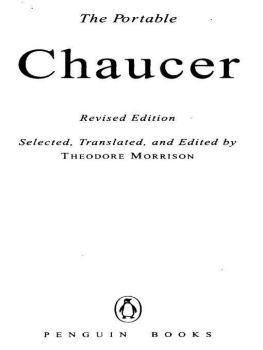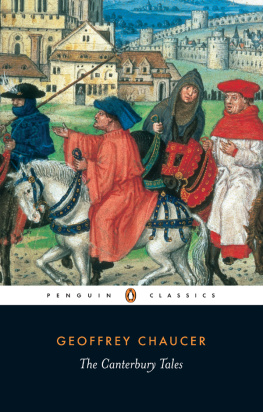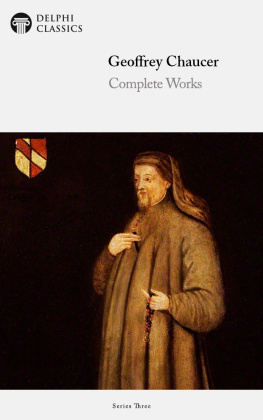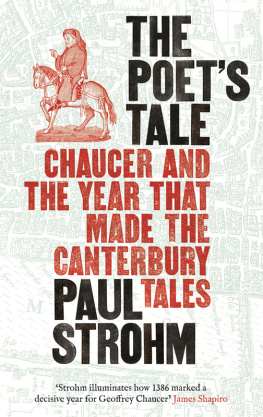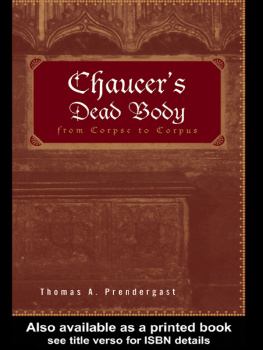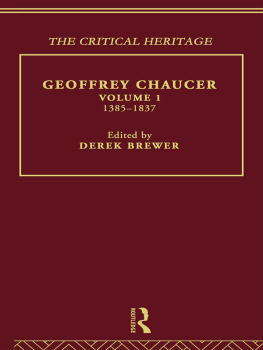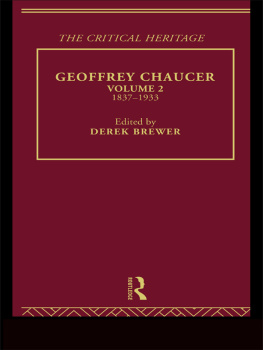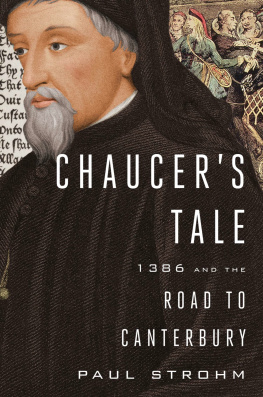Geoffrey Chaucer - Love Visions
Here you can read online Geoffrey Chaucer - Love Visions full text of the book (entire story) in english for free. Download pdf and epub, get meaning, cover and reviews about this ebook. year: 2009, publisher: Penguin, genre: Art. Description of the work, (preface) as well as reviews are available. Best literature library LitArk.com created for fans of good reading and offers a wide selection of genres:
Romance novel
Science fiction
Adventure
Detective
Science
History
Home and family
Prose
Art
Politics
Computer
Non-fiction
Religion
Business
Children
Humor
Choose a favorite category and find really read worthwhile books. Enjoy immersion in the world of imagination, feel the emotions of the characters or learn something new for yourself, make an fascinating discovery.
- Book:Love Visions
- Author:
- Publisher:Penguin
- Genre:
- Year:2009
- Rating:3 / 5
- Favourites:Add to favourites
- Your mark:
- 60
- 1
- 2
- 3
- 4
- 5
Love Visions: summary, description and annotation
We offer to read an annotation, description, summary or preface (depends on what the author of the book "Love Visions" wrote himself). If you haven't found the necessary information about the book — write in the comments, we will try to find it.
Spanning Chaucers working life, these four poems move from the conventional allegorical love visions toward realistic storytelling and provide a marvelous self-portrait. This selection includes The Book of the Duchess, The House of Fame, The Parliament of the Birds, and The Legend of Good Women.
Love Visions — read online for free the complete book (whole text) full work
Below is the text of the book, divided by pages. System saving the place of the last page read, allows you to conveniently read the book "Love Visions" online for free, without having to search again every time where you left off. Put a bookmark, and you can go to the page where you finished reading at any time.
Font size:
Interval:
Bookmark:

LOVE VISIONS
ADVISORY EDITOR: BETTY RADICE
GEOFFREY CHAUCER was born in London, the son of a vintner, in about 1342. He is known to have been a page to the Countess of Ulster in 1357, and Edward III valued him highly enough to pay a part of his ransom in 1360, after he had been captured fighting in France.
It was probably in France that Chaucers interest in poetry was aroused. Certainly he soon began to translate the long allegorical poem of courtly love, the Roman de la Rose. His literary experience was further increased by visits to the Italy of Boccaccio on the Kings business, and he was well-read in several languages and on many topics, such as astronomy, medicine, physics and alchemy.
Chaucer rose in royal employment, and became a knight of the shire for Kent (13856) and a Justice of the Peace. A lapse of favour during the temporary absence of his steady patron, John of Gaunt (to whom he was connected by his marriage), gave him time to begin organizing his unfinished Canterbury Tales. Later his fortunes revived, and at his death in 1400 he was buried in Westminster Abbey.
The order of his works is uncertain, but they include The Book of the Duchess, The House of Fame, The Parliament of Fowls, Troilus and Criseyde and a translation of Boethiuss De Consolatione Philosophiae.
BRIAN STONE wrote his first book, Prisoner from Alamein, which had a foreword by Desmond MacCarthy, in 1944. After the war, during which he was decorated, he entered the teaching profession and taught English in boys schools for eleven years. He then trained teachers for ten years at Loughborough and Brighton. In 1969 he became a founder member of the Open University, where he was Reader of Literature for the rest of his professional life. Besides Penguin Critical Studies of Chaucer and Keats, he has four other verse translations to his credit in the Penguin Classics: modern English renderings of Sir Gawain and the Green Knight; Medieval English Verse; The Owl and the Nightingale, Cleanness, St Erkenwald; and King Arthurs Death: Alliterative Morte Arthure and Stanzaic Le Morte Arthur.
Brian Stone died in London in March 1995. In its obituary the Independent described him as a brilliant teacher, an enthusiast for good English and an exceptionally brave man. He was unmistakable with his jaunty, determined, one-legged walk and air of buoyant optimism.
THE BOOK OF THE DUCHESS
THE HOUSE OF FAME
THE PARLIAMENT OF BIRDS
THE LEGEND OF GOOD WOMEN
Translated with an Introduction and Notes by
BRIAN STONE
PENGUIN BOOKS
PENGUIN BOOKS
Published by the Penguin Group
Penguin Books Ltd, 80 Strand, London, WC2R 0RL, England
Penguin Putnam Inc., 375 Hudson Street, New York, New York 10014, USA
Penguin Books Australia Ltd, Ringwood, Victoria, Australia
Penguin Books Canada Ltd, 10 Alcorn Avenue, Toronto, Ontario, Canada, M4V 3B2
Penguin Books (NZ) Ltd, 182190 Wairau Road, Auckland 10, New Zealand
Penguin Books Ltd, Registered Offices: 80 Strand, London, WC2R 0RL, England
This translation first published 1983
Translation and editorial matter copyright Brian Stone, 1983
All rights reserved
Except in the United States of America, this book is sold subject to the condition that it shall not, by way of trade or otherwise, be lent, re-sold, hired out, or otherwise circulated without the publishers prior consent in any form of binding or cover other than that in which it is published and without a similar condition including this condition being imposed on the subsequent purchaser
ISBN: 9781101492178
In offering translations of Chaucers four love visions, I should like at the outset to make the fullest possible acknowledgement to the late F. N. Robinson for his great edition of The Poetical Works of Chaucer (Houghton Mifflin Co., Boston, 1933; second edition 1954). I have always returned to it after consulting other editions; when I have quoted him here, the page numbers refer to the first edition. As was almost inevitable, at times I have drawn on his work indirectly, without specific reference, and I trust that this grateful acknowledgement to his extraordinarily full and informative scholarship will compensate for any formal omission of mine. My debt to other scholars is, I hope, made clear whenever I quote them, and the value I attach to their work is signalled by naming them in my select bibliography.
Of recent years, interest in work of Chaucers other than The Canterbury Tales has increased. Several translations of Troilus and Criseyde have appeared, and both that great poem and the early love visions are now occasionally set texts, not only in universities and colleges, but in schools. General public interest in our medieval heritage seems to increase year by year. So there is every justification for translating the love visions.
I have kept support material to the minimum, and I hope that the Notes will further understanding and enjoyment of the poems. In discussing classical references I have tried to give generally accepted versions rather than to be exhaustive concerning alternatives, or to define specifically medieval meanings unless the latter are crucial to the poetic reference.
A word on the problem of verse translation, which Chaucer himself faced whenever he borrowed and adapted a well-known passage from Ovid, or Froissart, or Jean de Meun, or Dante, or Boccaccio. Chaucers iambics, whether in four- or five-foot lines, run with an accentual freedom which his French peers eschewed or lacked, and for which he thought fit to apologize. Chaucer was responding to the nature of modern English, which was then in the making, and was breaking out of moulds set by Norman French conquerors and native, slightly archaic, exemplars. So in re-rendering Chaucer in twentieth-century English I too claim my freedoms, though always, I hope, in the interest of representing him as accurately as possible. To be precise: I have generally written iambics, and kept the right number of feet in the line; I have always looked for perfect rhyme, but have allowed imperfection when that seemed the only way of keeping decently close to original meaning; in including Chaucers catalogues of proper names, I have abandoned rhyme almost completely when forced to by the fact that the form and pronunciaton of the names have changed since his time. The great difficulty when translating such a shape-shifter as Chaucer, whose tone can change from lofty pathos to farce almost from one line to the next, is to hit the centre of poetic feeling with the appropriate vocabulary of today (with the occasional archaism, to be frank). The attempt leads into advanced interpretation as well as poetic invention, and in both matters I must submit to judgement.
Brian Stone
The Open University
April 1982
We know more about Chaucers life than Shakespeares. Shadow and surmise, so often met by inquirers into the circumstances in which our first poet lived and worked, loom lightlier over the life of our earlier great poet. Chaucer, who was born in the early 1340s and died in 1400, spent his life in and around London and the Court, employed as esquire when young, and later as soldier, diplomat and civil servant, by such people as Prince Lionel, Edward III, Richard II and especially John of Gaunt men whose first language was French, which was therefore the language of their courts, a circumstance which enhances Chaucers achievement. In the last year of his life, Chaucer served Henry IV. He travelled in the royal service to France and Italy, and probably met most of the English, French and Italian poetic master spirits of the age. He knew Gower, Strode, Froissart and Deschamps, probably met De Granson and Machaut, and may well have met Boccaccio and Petrarch. In view of the evidence that he led a busy life in the precincts of power for thirty years or so, his poetic output is surprisingly large the equivalent of about twelve Shakespeare plays.
Next pageFont size:
Interval:
Bookmark:
Similar books «Love Visions»
Look at similar books to Love Visions. We have selected literature similar in name and meaning in the hope of providing readers with more options to find new, interesting, not yet read works.
Discussion, reviews of the book Love Visions and just readers' own opinions. Leave your comments, write what you think about the work, its meaning or the main characters. Specify what exactly you liked and what you didn't like, and why you think so.


